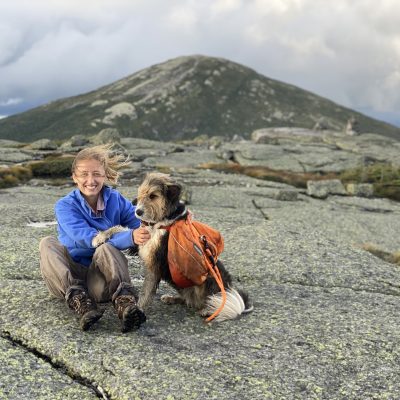Student Spotlight: Kara Fikrig

June 14, 2021
Kara Fikrig is a doctoral candidate in entomology from Guilford, Connecticut. After earning an undergraduate degree from Yale University, she chose to pursue further study at Cornell for the opportunity to work with her advisor, continue the work completed during her master’s of public health program, and explore the nature surrounding Ithaca. Fikrig won People’s Choice Award in the 2021 Three Minute Thesis competition.
What is your area of research and why is it important?
I study the feeding behavior of the tiger mosquito, which is a species that can transmit many pathogens, including Zika and dengue viruses. It’s important that we understand its feeding behavior because it is a pivotal part of disease transmission. The particular animal species that a mosquito bites will influence the types of pathogens that the mosquito picks up – pathogens are often harbored by a narrow subset of animal species, so if a mosquito doesn’t bite those species, it won’t become infected! And, importantly, a mosquito’s tendency to feed on humans impacts the potential to make humans sick with those pathogens.
What are the larger implications of this research?
Understanding basic mosquito feeding behavior is pivotal to making evidence-based control decisions. In the case of a disease outbreak, knowledge about feeding behavior can help inform which mosquitoes should be targeted to control the outbreak. Also, we might be able to use information about mosquito attraction to identify odor compounds that can be used to lure mosquitoes into traps by tricking them into thinking they are going to bite their preferred animal species.
You were named People’s Choice Award winner in the 2021 Three Minute Thesis (3MT) competition. Can you describe the process of condensing your research into a three-minute presentation?
It was challenging to condense my project into three minutes – but the process helped me to realize that many of the details that I considered crucial were in fact unnecessary to understand the overarching message. Prior to the 3MT, I presented a 10-minute version of this project. I began by stripping down the details and adding metaphors to make my research more relatable for the audience. But when I read it aloud, it was still six minutes long! It can be difficult to decide that a detail is unnecessary after spending months painstakingly measuring it, but I slowly whittled away additional details and whole portions of my project until I got it down to three minutes.
How will you take what you’ve learned from participating in the 3MT and use it in future academic and professional contexts?
I believe that it is our duty as scientists to communicate the work that we do with the public. However, communicating our science is not enough – we have to communicate in such a way that people actually listen and absorb what we are sharing. The 3MT competition is an excellent opportunity to develop and practice the skill of science communication. I learned new techniques, such as portraying enthusiasm despite being nervous, and had the opportunity to practice techniques that I had learned previously, like employing a hook to grab the listeners’ attention and using relatable metaphors. The skills that I developed through participating in the 3MT competition will help me to more effectively and confidently communicate my science in the future.
What are your hobbies or interests outside of your research or scholarship?
I am a strong believer in work-life balance, so I love to spend time on my hobbies! Before I started my Ph.D., I worked on ranches in Wyoming and Argentina. I still ride horses here in Ithaca with the Cornell polo team! Getting outside is really important to me – I love hiking, camping, cross-country skiing, kayaking – just about any way I can explore nature with my dog, Lucita. I also play soccer and dabble in rock-climbing during non-COVID times. And I love to read! Any genre, though historical fiction tends to be my favorite.
Why did you choose Cornell to pursue your degree?
I chose to pursue my degree at Cornell for a number of reasons. First, I was really excited to work with my advisor – I really admire the type of research that she conducts and hoped to be able to do similar research myself. Second, the Cornell field of entomology is fantastic. I had a master’s of public health prior to applying for a Ph.D. and knew that I wanted to concentrate on the mosquito facet of vector-borne diseases to round out my knowledge, so I was looking for a strong entomology program. And finally, Ithaca and the surrounding nature put Cornell over the edge for me. Access to nature is important to me, and it is so easy here!
